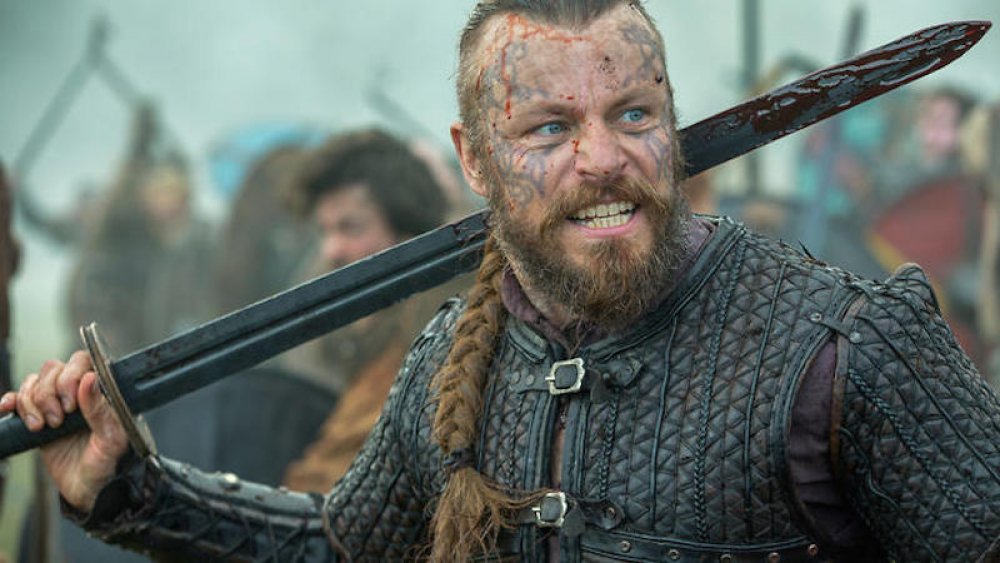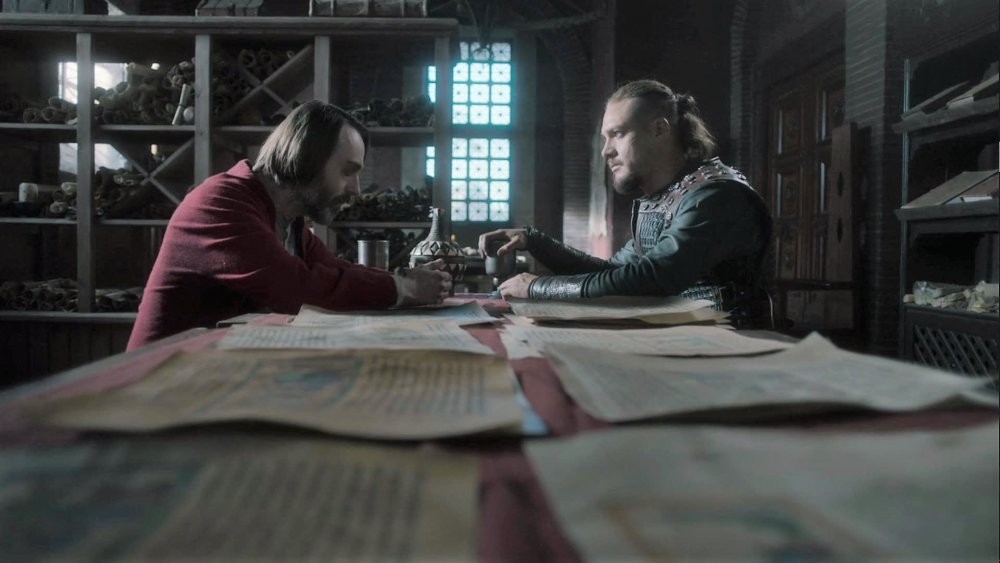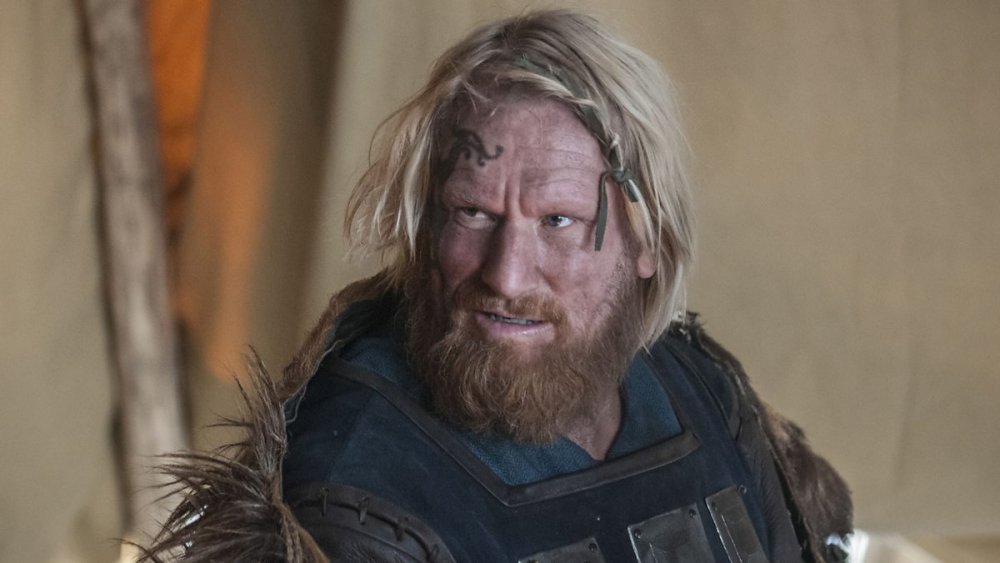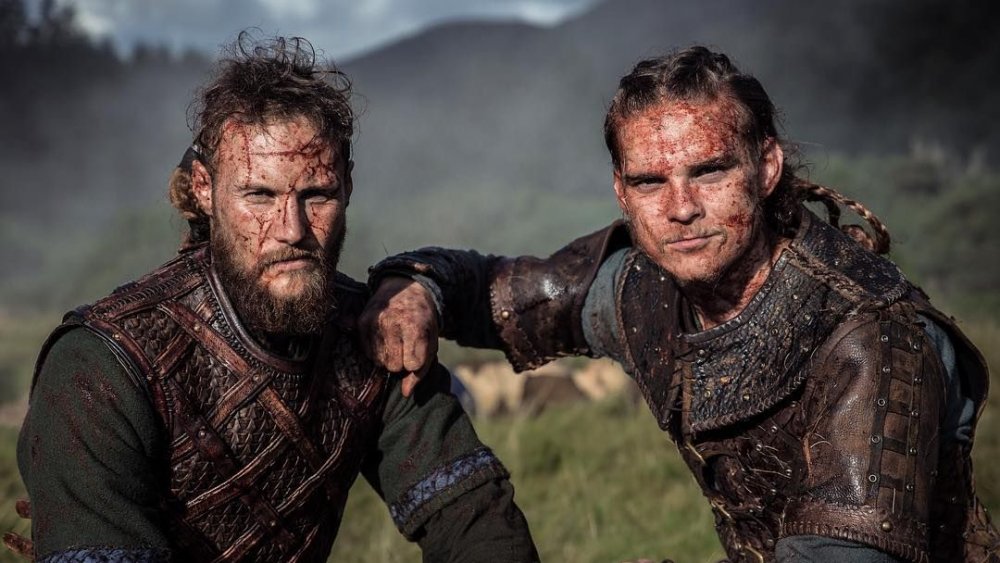How Are Vikings And The Last Kingdom Related?
Contains spoilers for Vikings season 6 and The Last Kingdom season 4
It's a great time to be a fan of medieval warfare on television. It's an even better time, if your medieval preferences skew toward the Viking Age. The era of peak TV has given us — not just one — but two quality costume dramas set in this poorly understood era of European History.
Vikings debuted on the History Channel in 2013, and went on to become a smash hit for the cabler. The stylized drama was created by Michael Hirst and follows the historical figure Ragnar Lothbrok (Travis Fimmel) through his rise to power in the fictional Scandinavian city of Kattegat and his subsequent raids against Saxon England and Frankia.
The Last Kingdom launched on Netflix two years after Vikings' bow. Originally a collaboration between Netflix and the BBC, the streamer took over production duties after season 2 — when the BBC dropped out citing costs. This series is adapted from British historical novelist Bernard Cornwell's Saxon Stories, recently rebranded as The Last Kingdom series. That series centers the Saxon experience in 9th century England as they struggle to pull disparate kingdoms together to repel an invading Scandinavian horde.
These two series seem so similar in their scope of coverage, that some fans are wondering if they might just be related. Although Vikings and The Last Kingdom share virtually no creative or technical staff, the two series are united by their subject matter. The shows cover overlapping timelines from our scant historical record of the era. They make such compelling tandem viewing because they dramatize the century-long existential struggle between the Saxons and the invading Scandinavians from opposite points of view.
Vikings and The Last Kingdom rely on the same primary sources
The historical record from this time period is both spotty and dubious. Our primary Saxon source for the events of the 9th century is the Anglo-Saxon Chronicle, authored principally during the reign of Alfred the Great. After the collapse of the Roman Empire, England shattered into dozens — if not hundreds — of petty kingdoms, plunging the entire region into the aptly named Dark Ages. Without Roman historians taking the annals in Latin or Roman governors keeping municipal records, the meticulous histories that characterized the classical period all but disappeared. Considering this vacuum, the Anglo-Saxon Chronicle is a relatively good primary source for events taking place on English soil (though it likely frames its native people in an overly flattering light). History is written by the victors, after all, and Alfred was eventually victorious. England is not Daneland.
Our primary Scandinavian source is a fragmentary collection of Old Norse poetry and a few Icelandic sagas. The Scandinavian sources provide even less historical value than the Chronicle, since both the sagas and the Old Norse poems resemble myths more than historical accounts. The figure Ragnar Lothbrok (if indeed such a person existed) is referenced in later historical sources — like the 12th century Gesta Danorum — but this English-authored text likely relied upon the Chronicle and the sagas for details about his life. It's clear that The Last Kingdom and Vikings made use of these exact same texts, since the two series agree on many of the major players of the time.
The Last Kingdom and Vikings share important characters
Ragnar, Ubba, Hvitserk, Ivar the Boneless, Sigurd Snake-in-the-Eye, Bjorn Ironside, the shieldmaiden Lagertha, Queen Aslaug, King Alfred — all of these figures are mentioned in one or more contemporaneous sources. Hirst and Cornwell both did their homework, and their overlapping characters prove it (Hirst confirmed as much to Express UK, and Cornwell includes a well-sourced historical note in the back of each of his books).
King Alfred is obviously a prominent player on both series, and each creator was especially dutiful in retracing the lineage of the West Saxon throne. Both Alfreds are the grandchildren of the historical King Ecbert (Linus Roache on Vikings), and both succeeded despite the existence of others with stronger claims. This squares with what historians know of the period. Since Hirst plays fast and loose with the timeline, his Alfred (Ferdia Walsh-Peelo) is just a boy during events when The Last Kingdom's Alfred (David Dawson) is a grown man. The Last Kingdom is likely the better representation of the historical Alfred in this regard, though Vikings provides an interesting portrait of the West Saxon monarchs who came before.
Then there's Ubba — yet another shared character who demonstrates both the similarities and the differences between the two series. The Ubba (Rune Temte) that Uhtred (Alexander Dreymon) kills on The Last Kingdom season 1 is the very same Ubbe (Jordan Patrick Smith) who now leads the sons of Ragnar in Kattegat on Vikings. Both the English and Scandinavian sources place him in Wessex at the time of the Great Heathen Invasion. It's an interesting quirk of the series' competing points of view that "Ubbe" is portrayed as a thoughtful hero, whereas "Ubba" is a savage raider.
We may see more of Ubbe the raider on Vikings soon. Now entering its final act, Hirst's series has passed the narrative baton from the deceased Ragnar Lothbrok (Travis Fimmel) to his sons. Two of those sons — Ubbe and Ivar — also feature prominently in Bernard Cornwell's The Last Kingdom books. If Vikings returns to Wessex to face off with King Alfred — as we predict it will — it will be interesting to see if any of the events match up with the events of The Last Kingdom.
It should be noted that the Ragnar (Peter Gantzler) who adopts Uhtred on The Last Kingdom is explicitly not intended to be the famous Ragnar Lothbrok. Ragnar is just a super common Viking name. By the time Uhtred is dispossessed of his land in Northumbria, Ragnar Lothbrok is long dead, and his sons are pretty much in charge of the heathens.
The Last Kingdom and Vikings each give a different take on the Great Heathen Invasion
Much of history depends on who's doing the telling, and this decidedly postmodern maxim is certainly at play in the differences between these two series. Although The Last Kingdom starts later in time relative to Vikings, the two series overlap at the reign of King Alfred the Great. Alfred earned his vaunted cognomen by repelling a massive Danish army that landed on the coast of England around 865. Alfred's heroic stand against the Danes hasn't quite played out on Vikings the way it does on The Last Kingdom, and these discrepancies may be a result of differences in point of view.
Here's where it gets a bit complicated. While Cornwell has a historical author's compulsion to stay within the bounds of known history, Hirst has demonstrated no such interest. As a result, Vikings plays around significantly with the accepted timelines for events laid out in the Anglo-Saxon Chronicle. This makes it difficult to piece together the two series, but it's fair to say that the action of Vikings takes place before the action of The Last Kingdom. At the start of The Last Kingdom season 1, Ragnar Lothbrok is dead and The Great Heathen Invasion has already begun. Ubba and Ivar are running roughshod over the Saxon kingdoms, and only Wessex remains to stand against them. Vikings appears to catch up with these events during season 4, after Ragnar is killed by King Aelle (Ivan Kaye). Ragnar's sons sail to England for vengeance, and Hirst's version of the Great Heathen Invasion begins.
Vikings may be driving toward events that happened on The Last Kingdom season 1
Here's where Hirst's history becomes especially murky. Cornwell's contiguous tale of the struggle for West Saxon survival more closely follows the events of the Anglo-Saxon Chronicle. Since Hirst has chosen to prioritize the Scandinavian point of view, he appears to have ahistorically bifurcated the Great Heathen Invasion. Back on season 4, he covered a successful Viking campaign against England led by the sons of Ragnar. Alfred, who is just a child at this point, is hardly even a player. This certainly doesn't square with the history. The Viking army more or less leaves England of their own accord. They certainly aren't repelled by Saxons. Why introduce Alfred at all if Hirst doesn't plan to use him?
With Alfred now grown (a bit) and sitting comfortably on the West Saxon throne, it seems likely that Hirst will send Ubbe and Ivar (Alex Høgh) back to England for The Great Heathen Invasion part two. If this is the game plan, then there's a good chance Vikings will conclude in the same place that The Last Kingdom ended season 1 — with the death of Ubbe-Ubba and the triumph of Alfred's Wessex.
We should have our confirmation once Vikings returns with the second half of season 6.




